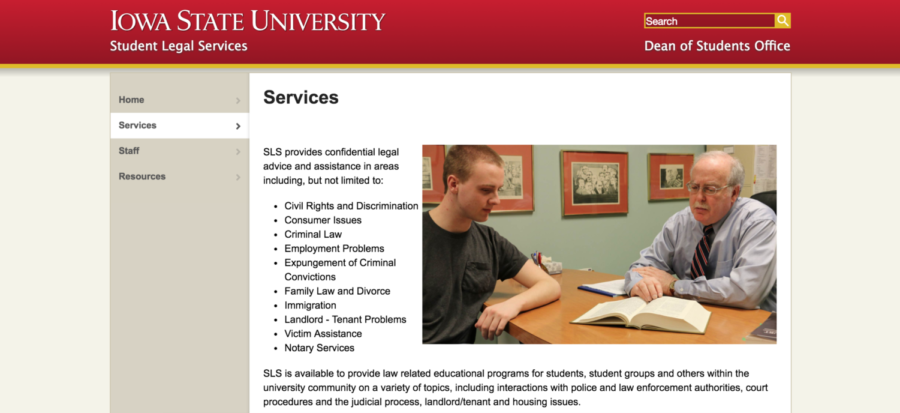Student Legal Services as a resource for students
September 1, 2020
Student Legal Services (SLS) are three scary words. Oftentimes, when legal aid is involved, there’s also a problem that needs to be sorted out.
However, like most faculty and staff at Iowa State, they’re here to help solve your problems. The staff, although small but mighty, is willing and able to help Iowa State students with areas of concern from victim assistance to civil rights and discrimination issues.
Attorney and co-director Paul Johnson has been with SLS since 1990. His previous experience includes work with Linn County Mental Health and Disability Services and the Iowa Department of Human Services in Black Hawk County.
Johnson received his bachelor’s in sociology from the University of Northern Iowa and received his law degree from the University of Iowa.
Attorney and co-director Michael Levine has also been with SLS since 1990. His previous experience includes serving in the Office of the Polk County Attorney, Criminal Division, as an assistant Polk County attorney.
He also served as an administrative hearing officer, Appeals Section, with the Iowa Department of Job Services. Levine is a member of the Iowa State and Story County Bar Associations and the American Immigration Lawyers Association.
Levine attended the University of Oklahoma and received his bachelor’s in history from the University of Iowa. Levine received his law degree from the Drake University Law School.
Debbie Carter, SLS office coordinator, has worked for SLS since 1999. Carter is an Iowa State alum and serves as a notary public for SLS, meaning she is authorized to perform certain legal formalities.
“Basically the main thing we’ll provide to students is knowing what their legal issues involve,” Johnson said. “Knowing [their] rights and responsibilities and proof, knowing what evidence supports their case and what will help their case.”
Johnson noted the fact that there’s only two attorneys to serve a student body of roughly 36,000 students.
“That gives us a lot of work, in other words,” Johnson said. “We do a lot of the same cases private attorneys do. We see more younger-type issues like alcohol violations, traffic violations. Our most frequent type of issues are housing, landlord, tenant-type issues. Those are common in all college towns. Of course you have the misdemeanor alcohol-related offenses.”
He compared the work done by SLS to a small town law office, based on the population at Iowa State and the size of their office.
One of the perks of SLS is they’re a resource any and all Iowa State students can utilize.
“One of my friends told me about legal services at ISU,” an anonymous source said. “I heard of them through word of mouth.”
After a night out in February, the anonymous source said they were arrested for public intoxication, causing them to spend a night in the Story County Jail. Once they passed the breathalyzer test enabling them to leave, they soon got news they had to attend a trial to determine further action.
“I didn’t know what to do at first, but now I’ve been working with a lawyer ever since,” the anonymous source said.
SLS is funded by the Student Government through student fees. That way students don’t have to pay for legal aid when utilizing SLS.
“I would one hundred percent recommend it because it’s free and they’re knowledgeable experts in the field,” an anonymous source said.
One of the goals of SLS is helping students understand and be comfortable with the legal process specific to their issues.
“Legal issues are stressful for students,” Johnson said. “They’re stressful in terms of a time commitment to deal with, the monetary impact of those issues, stressful in terms of learning exactly the legal impact of those issues and Student Legal Services can help those issues by taking some of those stressors away.”
Johnson wants students to understand that working on resolving their legal issues shouldn’t take away from their studies and other commitments.
Typically located in the bottom of the Memorial Union, students will work with the attorneys via over-the-phone consultations. These consultations will be just as in-depth and productive as in-person meetings, but due to the current rise in COVID-19 cases and wanting to be preventative, SLS thought it was best to move to phone consults.
Although it may look different this year, their efforts remain the same.
“[We want to] familiarize them with court procedures to make them comfortable with those type of circumstances, the more they know about the law, their rights and the legal procedures — that gives them comfort,” Johnson said.







